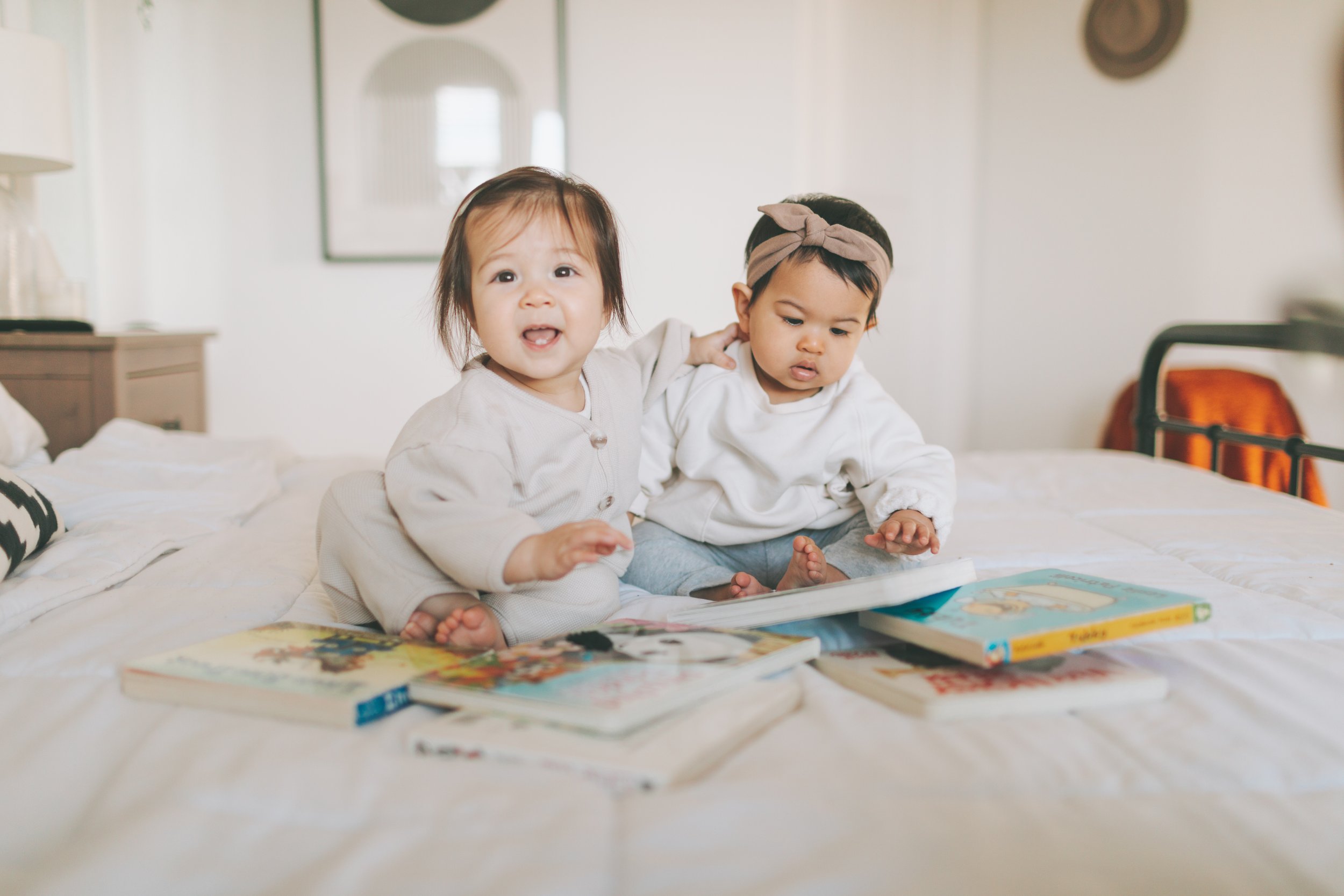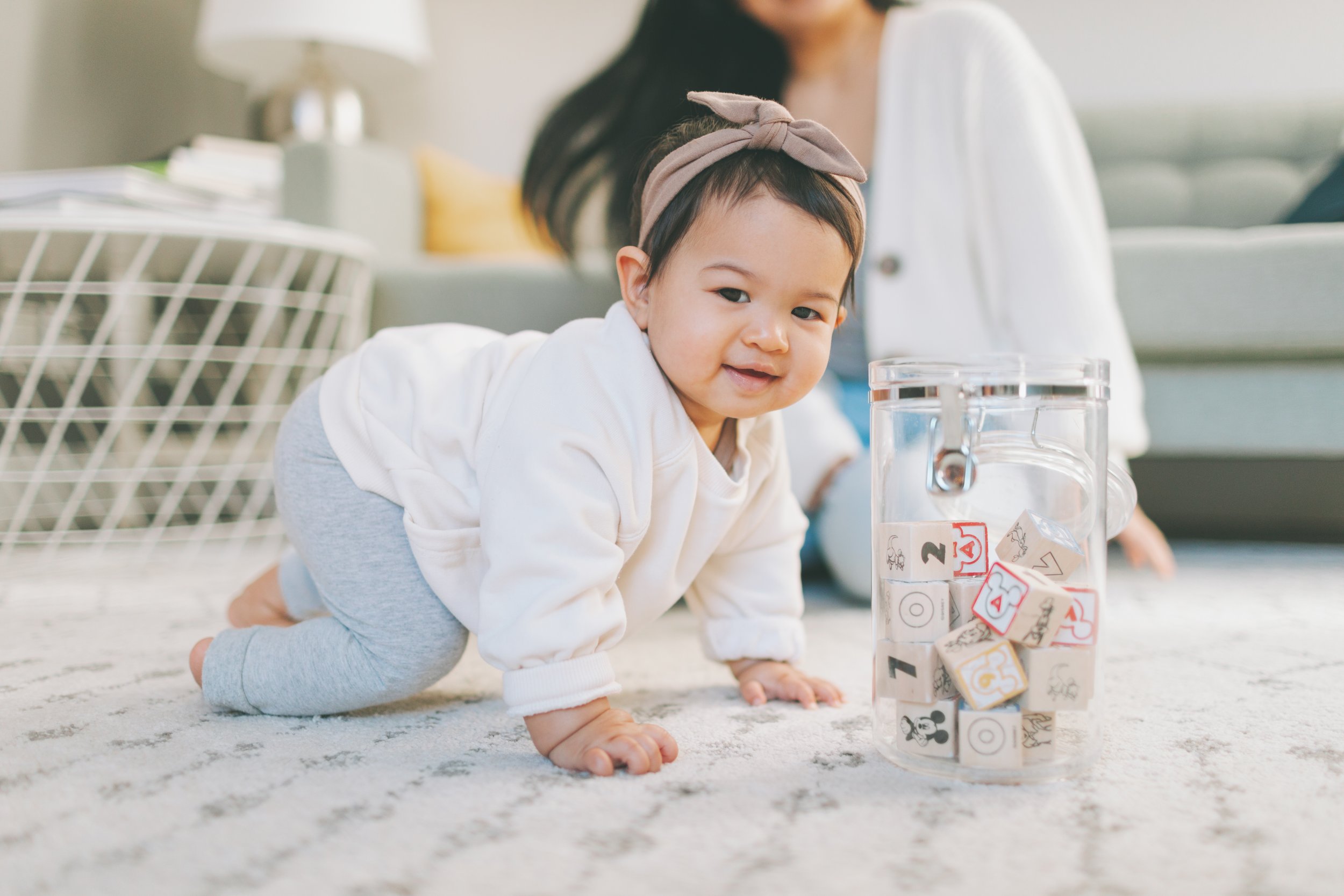The Stages of Speech Development in Babies
We love that you’re interested in the stages of speech development for babies, because so often it’s not on a parent’s radar until they’re expecting first words around your baby’s first birthday. But there are so many exciting and foundational things happening long before a baby ever says their first words—things that are easy to miss if we don’t know what to watch for! By learning them now, you’re being proactive and giving yourself the advantage of knowing exactly what to know and do during baby’s first year of life. (Go you!)
Your Baby’s Brain Is Growing So Quickly!
The first three years of life are what we call a critical developmental period. Your baby’s brain is growing faster during these years than it ever will again! And, if you think about it, that’s really no surprise—at least not when you consider how much they change in just 36 months. From birth to three years, babies go from being completely dependent on us to being walking, talking, highly opinionated 😅 little people. These are WAY bigger changes than we ever go through again in life. (Imagine if we went through fundamental changes like that between ages 18 and 21, or 35 to 38!)
Often, our littles change so quickly that it feels like a new skill magically appears each day. But babies and toddlers don’t just start talking out of nowhere. What actually happens within our babies’ brains is much more impressive: they slowly build up their skills by achieving mini developmental milestones along the way. These mini milestones are often really subtle—if you don’t know what you’re watching for, you could miss them completely. But, they’re happening nonetheless, and they’re incredibly important when it comes to meeting bigger milestones down the road.
By learning about all these mini language milestones and pre-talking skills, you’re giving yourself a window into what’s going on in your baby’s super-impressive and quickly-growing brain. And, you’re giving yourself the opportunity to be proactive, because by noticing anytime your child doesn’t meet a mini milestone that we’d expect them to, you can either intentionally help them by working on it yourself, or find the professional support they might need. So high fives to you for being here and equipping yourself in this way! ✋🏾
The Stages of Speech Development in Babies
Now that you know why this information is so important for you to know as a parent, we’ll break down how speech and language skills progress at each stage of your baby’s development. We’ll give you the tools to watch for both receptive language development (things like hearing and understanding) and expressive language development (talking, gestures, babbles, etc.).
Pro Tip: Our Baby Milestones Checklist makes it easy to track receptive and expressive language development in your baby. Download your copy before you read on!
Below are the pre-talking speech and language development milestones babies typically achieve before 12 months of age, as reported by the American Speech-Language-Hearing association (ASHA). We look for the skills included below to emerge by the end of each age range.
SPEECH DEVELOPMENT FROM Birth–3 Months
During this stage, speech and language development probably isn’t on your mind at all, and we don’t think it should be. Take the time to get to know your new baby and take care of yourself during this precious and sometimes challenging time.
Your baby’s favorite sound in the world is your voice! Around 6 weeks of age is an exciting time when your baby’s social smile will begin to emerge. There is nothing sweeter. They’ll also begin to coo during this time, producing open mouth vowel sounds like “aaaaa”, “ooooo”, “uuuu”, etc.
Hearing & Understanding
The receptive language development milestones we’d expect your baby to meet from birth to three months are:
Startling at loud sounds
Quieting down or smiling when you talk
Appearing to recognize your voice (Ex: your voice quiets them if they’re crying)
Talking
The expressive language milestones we look for from birth to three months are:
Making cooing sounds
Using different sounds to indicate different needs
Smiling at people
SPEECH DEVELOPMENT FROM 4–6 Months
This is such a fun stage as your baby becomes more and more interactive with you. They’ll begin to make more and more sounds as they learn about how their lips, tongue and jaw work together to produce those sounds. This is a great time to create a routine of reading together daily and start singing simple songs and rhymes, if you haven’t done so already. If you don’t know many, we can send you one of our fav songs for bathtime!
Hearing & Understanding
By 4-6 months, we’d expect your baby to demonstrate the following receptive language skills:
Moving their eyes in the direction of sounds
Responding to changes in your tone of voice
Noticing toys that make sounds
Paying attention to music
Talking
We’d also expect your baby to meet these expressive language mini milestones:
Cooing and babbling when playing alone or with you
Making speech-like babbling sounds (Like pa, ba, and mi)
Giggling and laughing
Making sounds when happy or upset
SPEECH DEVELOPMENT FROM 7 Months–1 Year
This stage is so exciting when it comes to communication development because baby is getting super close to first words! Your baby will start to be very communicative with you, using non-verbal communication like gestures and eye gazing. You’ll also notice them beginning to understand things you say, like their name and other words they hear frequently. This is an important step because your baby needs to understand words before they will say them.
Hearing & Understanding
During this 6-month period, you’ll start to notice your baby:
Turning and looking in the direction of sounds
Looking when you point
Turning when you call their name
Understanding words for common items and people (Like juice and daddy)
Starting to respond to simple words and phrases (Like “No,” and “Want more?”)
Playing games with you (Like peek-a-boo and pat-a-cake)
Listening to songs and stories for a short time
Talking
The expressive language mini-milestones we’d expect your baby to meet are:
Babbling long strings of sounds (Like mimi, upup, or babababa)
Using sounds and gestures to get and keep attention
Pointing to objects and showing them to others
Using gestures like waving bye, reaching for “up,” and shaking their head no
Imitating different speech sounds
Saying 1 or 2 words, like hi, dog, dada, mama, or uh-oh. (This typically happens around their first birthday, but the sounds may not be perfectly clear.)
Babbling Is A Big Deal!
Babbling is a big pre-talking milestone for babies, but it can appear any time between 5 months and 9 months of age, which is quite a range! You don’t need to panic or worry too much if your baby isn’t babbling at 5 months, but it’s worth taking the time to understand when babies start babbling and learn how to encourage babbling in your little one!
How To Support Your Baby’s Speech Development
There are a lot of little mini skills that lead to talking, and if you tried to individually work on each one with your child, you’d probably run out of hours in the day! As speech therapists, we’d never recommend this, and as moms, we do not want to put more on your plate. Thankfully, there’s a much simpler way to go about encouraging baby’s speech development: talking, singing, and reading together!
We love encouraging parents to talk, sing, and read with their babies as much as possible, because chances are these are things you’re already doing at least a little bit, so it won’t feel like another to-do. Plus, these strategies are both efficient and effective ways to support all the pre-talking skills and language development mini-milestones baby is developing at once.
If you’re not sure where to get started with this—if talking to baby feels a little awkward or you feel like the ONLY song you know is Twinkle, Twinkle, Little Star 😅 —check out TalkBaby, our super-practical course that teaches you how to sing, read, connect, and encourage first words. (Best part? It only takes, like, two nap times to complete!)
Keep Track of Baby’s Speech and Language Development
We love that you’re already thinking about your baby’s development. When it comes to speech and language, being proactive is so important! So even just by reading this post, you’re doing something great for them. To keep the learning going, we recommend that you grab our free resource: The Baby Bundle.
The Bundle includes:
Our baby language milestones checklist
The “All About First Words” handout we give out at parent groups
A free baby song video you can learn and sing during your next bath or bedtime routine
It’s everything you need to know, do, and watch for during baby’s first year! We know you and your baby will love it.





